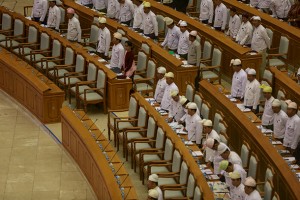President Thein Sein’s Chance to Reject Discriminatory Laws
By Burma Partnership • August 24, 2015As the Lower House of Parliament convenes after the dramatic purge of speaker Shwe Mann, it has wasted no time passing two laws that form the package of discriminatory protection of race and religion bills. The first two have already been passed by Parliament earlier this year, and the remaining two, the ‘Religious Conversion Bill’ and the ‘Monogamy Bill’ were approved last week. Now the final passage is just awaiting the decision from President Thein Sein.
The four Race and Religion Protection Bills is a package proposed by the Association to Protect Race and Religion, otherwise known as Ma Ba Tha, a powerful grouping of monks founded in mid-2013, that espouses anti-Muslim rhetoric and spreads extremist, ultra-nationalist propaganda. The package of bills originates from Ma Ba Tha and was introduced into Parliament in November 2014.
The first bill, the ‘Population Control Bill’ passed into law in May, 2015 by both Parliament and the President, allows authorities to order ‘birth spacing’ so that married couples need to wait 36 months between each child they have. There is a fear, across many communities in Burma, stoked and exacerbated by groups such as Ma Ba Tha, that Islam will replace Buddhism as the dominant religion. The ‘Population Control Bill’ feeds into this narrative.
The second bill that was passed by Parliament in July 2015, but yet to be signed into law by President Thein Sein, is the ‘Buddhist Women’s Special Marriage Law,’ otherwise known as the ‘interfaith marriage bill.’ This law requires permission for Buddhist women to marry outside their faith. It again feeds into the perception that Muslim men are marrying Buddhist women in an attempt to spread Islam throughout the country.
The third and fourth bills, passed by Parliament last week, the ‘Religious Conversion Bill’ and the ‘Monogamy Bill’ are also discriminatory. The ‘Religious Conversion bill’ stipulates that that any person wishing to change religion must receive permission from the authorities while the monogamy bill appears redundant as legislation already exists that prohibits polygamy.
The package of laws are discriminatory and dangerous to the reform process, as pointed out by UN Special Rapporteur on the situation of human rights in Burma, Yanghee Lee, “Areas requiring regulation, such as laws for marriage, divorce and succession, should be the subject of a law common to all people of Myanmar, irrespective of their race and religion, in full compliance with international human rights norms. If these bills are passed, it could be viewed as one of the indicators of backtracking in the political reform process.”
The bills also violate Burma’s existing obligations to international human rights norms. In particular the package contravenes the Convention on the Elimination of all forms of Discrimination against Women (CEDAW) which stipulates that governments must, “eliminate discrimination against women in all matters relating to marriage and family relations.”
The whole package is a less than subtle attempt by the Government to garner political support in the lead up to the 2015 elections in an environment that is increasingly hostile and xenophobic, a situation that has been fueled by ultra nationalist and extremist activists and monks such as Ma Ba Tha. As Charles Santiago, Chairperson of the ASEAN Parliamentarians for Human Rights explained in a statement, “The military government is playing a dangerous game. It appears to be purposefully pandering to sentiments of xenophobia, racism, and nationalism for its own political gain and at the expense of the rights of millions of Myanmar’s minority citizens.”
With both rights-based civil society and the international community consistently expressing their concern over the worsening of the human rights situation for religious minorities and women that this package of bills will bring, it is to much frustration that lawmakers are ignoring their calls. Meanwhile, as the continued persecution of religious minorities in Burma is exacerbated by official, state-sponsored discrimination, the move towards a solution to the protracted problems of religious-based violence slips further away.
There are three bills at President Thein Sein’s desk now ready to be signed into law. If he is truly a reformer as he is hailed to be, he would not pass them. Unfortunately, as per the first bill of the package, it is not likely that he will oppose the laws. Passing them is a vote-winner in communities exploited by extreme elements of Burmese society and this is more important than human rights. We call on President Thein Sein to prove himself as someone who will stand up for democracy and human rights and reject these bills. We also call on the international community, especially those which are providing political and financial support to the Burma Government, to apply all necessary pressure in order to prevent another setback for democracy and human rights in Burma during this reform process.
Tags: Burma Partnership, Ma Ba Tha, Protection of Race and Religion, Race and ReligionThis post is in: Blog
Related PostsBurma Partnership Celebrates Continuing Regional Solidarity for Burma and Embraces the Work Ahead for Progressive Voice
Burma Army Displays Blatant Disregard for 21st Century Panglong Peace Process
Ann Din Coal Power Plant: Local Movement and Action to Preserve and Protect Natural Resources and Land: Mon IDP Report Case Study #4
Latest Human Rights Abuse Case Demonstrates Urgent Need to Reform the Myanmar National Human Rights Commission
Human Rights Far From Guaranteed as US Sanctions on Burma Are Removed










 All posts
All posts